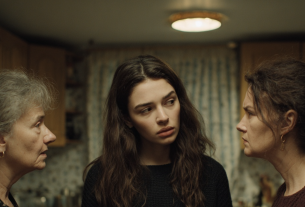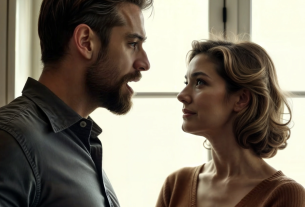“Give me the keys to your car, I need to get to the resort,” Maxim tossed out without looking up from what he was doing.
Hot steam hissed from under the iron, smoothing the last stubborn crease on the snow-white shirt collar. He did it with showy nonchalance, as if the mere fact that he was ironing his own clothes were some kind of heroic feat. His request didn’t sound like a request at all—it landed as a statement of fact, as though he were simply reading out a self-evident item on his morning to-do list.
Alina, sitting at the kitchen table, took a slow sip of coffee. She didn’t look his way. Her eyes were fixed on the window, on the gray courtyard where car roofs gleamed under a drizzling rain.
“Taxi,” she said, her voice even and calm, emptied of all emotion. One word, dropped into the air.
The iron went silent. Maxim switched it off and set it down on the ironing board with a dull thud. He turned. The face that had just displayed condescending calm began to change, slowly.
“What? What taxi?” He spoke as if she’d said something outrageously stupid. “We’ve got a car right under the window.”
“I’ve got a car,” Alina corrected, setting her empty cup onto its saucer with care. The clink of porcelain on porcelain sounded unnaturally loud in the morning quiet. She finally turned and looked at him. Directly. Without challenge, but without a shred of doubt. “You wrapped yours around a pole when you were joyriding drunk. And you lost your license. Remember?”
“So what? It happens! I don’t have a car now, which is why I’ll take yours.”
“That’s your problem, my dear—that you don’t have a car anymore. You got behind the wheel when you could barely stand, so don’t even ask for mine. You are never driving my car.”
Each word landed cleanly, as if she were reading a verdict aloud. No reproach, no anger—just dry facts you couldn’t bat away. The air in the kitchen thickened. Maxim walked slowly to the table and loomed over her. He didn’t touch her, but his whole body—big, strong—became a tool of pressure. He was used to that being enough.
“Alina, don’t make me angry. I said give me the keys.”
She neither drew back nor shrank into her chair. She simply lifted her eyes to him. There was no fear in her gaze, only a cold, distant weariness. She’d seen this scene dozens of times before, just with different props.
“No. You are not getting behind the wheel of my car. Ever.”
That last word came softer, but it hit harder than any shout. It was final, like a period at the end of a long, painful sentence.
His face turned purple. The control he valued so highly began to crack.
“Are you out of your mind? How am I supposed to show up to a work event in a taxi? Like some pauper? In front of the whole department! You’re doing this on purpose! You want to humiliate me in front of the guys!”
He wasn’t yelling, but his voice vibrated with pent-up fury. He slipped into the familiar, coarse “you,” the form he always used when he felt his footing go. That was his weapon—turn everything personal, force her to defend herself, to justify. But she didn’t defend. She watched him in silence, letting his words fall into a void. She let him run it out, spill all that poison.
When he finally fell silent, breathing hard, she did what he least expected. She picked up her phone from the table and held it out to him. A barely visible, bitter smirk touched her lips.
“Here,” she said in the same level tone. “Call your mother. Maybe she’ll lend you her old clunker.”
He froze, staring at the phone in her hand and then at her face, unable to grasp the full measure of the mockery. Alina didn’t lower her hand. Her gaze hardened.
“Just don’t forget to remind her you don’t have a license.”
He snatched the phone with such force it was as if he meant to break it. His fingers darted over the screen with hatred, dialing the number he knew by heart. Alina rose calmly, took her cup, and went to the sink, deliberately turning her back. The performance was over. Act Two was beginning.
“Mom, it’s me,” he said, and in a heartbeat the anger ringing in his voice melted into a pleading, almost childlike tone he reserved solely for his mother.
Alina had heard that voice before. It was the voice of a little boy who’d been wronged in the sandbox and ran to the only person in the world who was always on his side. She rinsed the cup under the stream of water, set it in the rack, and picked up a cloth. She didn’t hurry. Every movement was purposefully measured, as if she lived in a different, slower, quieter world where the echoes of his phone-drama didn’t reach.
“No, it’s fine… almost. I’m calling because… I’ve got a company event today, out of town. Alina’s throwing a fit, won’t give me the car keys.”
He paused, listening to the chirping on the line. Alina wiped an already spotless countertop with methodical precision. She could hear in her head exactly what Svetlana Anatolyevna was saying. Something about “completely out of control,” about “doesn’t appreciate a husband like you,” about “I told you so.” She knew that script to the point of nausea.
“Yeah, that’s what I’m telling her! That it’s humiliating! That now I have to… No, can you believe it, no! She says, call a taxi. Says she’ll never give it to me. Ever.”
He paced the kitchen, wall to wall, like an animal in a cage, and the phone was his only line to the open air. He shot short, angry looks at Alina’s back, but she didn’t turn. She was a deaf wall his emotions bounced off. That enraged him even more. He needed an audience for his performance, and his main spectator had deliberately left the theater.
“Yours? Mom, are you serious?” His voice changed again—real relief now, and a budding triumph. He stopped in the middle of the kitchen, his face brightening. “Of course I’ll come by! Sure it’ll start—why wouldn’t it! Mom, you’re saving me! Thanks! Kisses, I’ll be there soon!”
He hung up and slammed the phone onto the table. The crack of plastic on wood was sharp and defiant. He looked at Alina, who was just then tossing the empty yogurt cup into the trash. Triumph danced in his eyes. He’d won this round. He’d found a way out. He’d proved to her she wasn’t the center of his universe, that there were others ready to help.
“See? Not everyone in this world is like you. There are still normal, loving people who are willing to help instead of sticking spokes in your wheels.”
He said it loftily, with a sense of complete moral superiority. He waited for her to snap back, to say something, but Alina only closed the cupboard door in silence.
“I’m very happy for you, Maxim,” she said without turning. “And for your mother as well.”
Then she walked out of the kitchen, leaving him alone with his little triumph. He stood for a moment more, savoring his victory, then went to the bedroom, grabbed the freshly ironed shirt from the board, and started dressing. He had won a tactical victory, silencing her and securing a ride. But somewhere at the back of his mind an unpleasant feeling stirred—that he’d actually lost something far more important. He just didn’t yet know what.
It was long past midnight. Alina wasn’t asleep. She sat in the living room with a book in her lap, but she wasn’t reading. The floor lamp poured light onto the pages, but the letters wouldn’t form words. She was simply waiting, listening to the house’s nighttime sounds. She knew this would happen. She didn’t know how exactly, but she was sure of the ending’s inevitability.
First she heard a dull scraping at the door, then uncertain, shuffling fumbling. The key couldn’t find the keyhole for a long time. At last the lock clicked and the door flew open. Maxim stood on the threshold. He was wet from the rain, hair stuck to his forehead, the expensive shirt he’d so carefully ironed that morning reduced to a wrinkled rag. He was drunk. But it wasn’t the merry or aggressive kind she knew. It was the drunkenness of defeat. He was broken.
He came in without looking at her and walked silently to the coffee table. From the inside pocket of his jacket he took a sheet of paper, folded in quarters and crumpled, and dropped it on the glass. A citation. A white form filled out in blue ink that, in the room’s dim light, looked like a death certificate.
Alina didn’t move. She watched him—his slumped shoulders, the way he sank heavily into the armchair and tipped his head back. He didn’t say a word. But behind him, in the doorway, another figure appeared. Svetlana Anatolyevna. Her coat was open, her face stern and decisive, like a general arriving on the field of a lost battle. She came in, shut the door behind her, and, without taking off her coat, fixed her gaze on Alina.
“Happy now?” Her voice was hard as steel. There was no question in it, only accusation.
Alina slowly closed her book and set it beside her.
“What exactly should I be happy about, Svetlana Anatolyevna?”
“About all of it!” She swept her arm around the room, indicating her son, who sat in the chair with his eyes closed. “This is what you wanted! You drove the man to this! Look what you’ve done!”
She came closer, her energy filling the space. Maxim sat motionless, playing the victim—the role his mother so gladly bestowed on him.
“If you’d given him your car—a normal, decent car—none of this would have happened!” she went on, raising her voice. “But no! You had to show your character! You had to humiliate him! You made him go in my old heap!”
“Your ‘old heap’ is in working order,” Alina answered evenly. “And it has nothing to do with your son not knowing how to handle his liquor. Or not knowing how not to drive when he’s been drinking.”
“Don’t you dare!” snapped Svetlana Anatolyevna. “He wouldn’t have had any accident in your car! Your brakes are better, and it’s newer! They would have just let him through on the road, and no one even looks at my old thing! He clipped another car in the parking lot because he couldn’t feel the dimensions! Because he’s used to something better, and you deprived him of that!”
The absurdity of the accusation was so monstrous that Alina was speechless for a moment. They weren’t blaming her for refusing a drunk, but for providing an instrument insufficiently good for committing an offense.
“You’re right, Mom…” Maxim muttered suddenly, eyes still closed. His voice was muffled and pitiful. “She did it on purpose. She just hates me.”
It was a well-honed tactic. He egged her on while the mother launched her attack with double force.
“Hear that? Hear what the child says? You set him up on purpose! So he’d crash in my car while yours sat nice and safe under the window! You knew there was a corporate party, that he’d be drinking! You wanted it to end like this!”
Svetlana Anatolyevna towered over her, almost shouting in her face. Her cheeks were flushed, her eyes blazing with the righteous fury of a she-wolf defending her cub. Alina looked at the pair—at the crushed thirty-year-old “child” and his ferocious protector. And there was no defense left in her eyes. Only cold, crystalline ice. She listened in silence to the very last word, then slowly, very slowly, lifted her gaze to them. The performance was over. The verdict was beginning.
Alina rose from the sofa. The movement was smooth, without sharpness, but so final that Svetlana Anatolyevna involuntarily stepped back half a pace. Alina didn’t raise her voice. She looked at her mother-in-law the way one looks at a foolish but utterly predictable creature.
“No, Svetlana Anatolyevna. I didn’t want it to end like this. I knew it would end like this. There’s a big difference.” Her voice was quiet, but it cut living flesh better than any scream. “You think I refused him the car out of spite? To humiliate him? No. I refused because he’s an irresponsible, infantile alcoholic. The one you raised.”
Maxim jerked in the chair as if struck and half opened his eyes. His mother’s face contorted.
“How dare—”
“Silence,” Alina cut her off. One word, spoken without pressure but with such icy authority that Svetlana Anatolyevna choked on air and fell quiet.
Alina turned her gaze to her husband. A smile played on her lips—one of pure contempt and exhaustion.
“You think this is about a car? A piece of metal? It’s about you, Maxim. About the fact that you’re thirty and still solve your problems by calling your mother. You didn’t get a toy—you tattled. You broke the law—they hauled in your mom to scold the ‘bad’ wife. Your mother doesn’t love you; she services you. She’s your permanent crutch without which you can’t take a step. She fixes your problems, gives you her old things, excuses your benders, and covers for your uselessness.
“You smashed your car—the pole was to blame. You lost your license—the cop was to blame. You wrecked your mother’s car—I’m to blame because I didn’t give you mine. There’s never anyone guilty in the mirror, Maxim. Only in the reflection. And today you hit rock bottom. You didn’t just drive without a license. You drove drunk. You’re not a man ‘humiliated’ by being refused a car. You’re a danger to society—a child who can’t be trusted with anything more complicated than a TV remote.”
She paused, giving them both time to absorb it. Horror stared back at her from Svetlana Anatolyevna’s eyes, as if she were seeing a monster. She wanted to say something but found no words. All her stock lines about “care” and “motherly love” had just been obliterated.
Alina turned back to her mother-in-law. Her face was perfectly calm.
“Take your boy, Svetlana Anatolyevna. Get him home. Put him to bed. In the morning give him some pickle brine and money for the fine. Do what you’ve always done. Only now you’ll do it without me.”
She walked to the floor lamp, picked up her book from the sofa, and, without looking at them, went to the bedroom. She didn’t slam the door. She simply pulled it to behind her, cutting herself off from them.
Emptiness settled over the living room. Maxim slowly lifted his head and looked at his mother with a bleary, uncomprehending gaze. Shaking herself from her stupor, Svetlana Anatolyevna jumped up to him. She didn’t shout. Fussy, almost frightened, she began to haul him to his feet, supporting him under the arm like a feeble old man.
“Come on, son… let’s go… let’s go home…”
He obeyed. Leaning on her, he staggered toward the exit. Mother and son, bound by one corrupt, suffocating bond, left the apartment. The door closed softly behind them. The apartment fell utterly quiet. But it wasn’t the silence after a quarrel. It was the silence of liberation.



